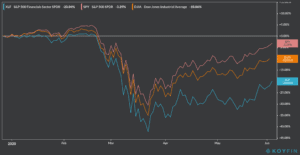US banks lag behind the broader stock market and give an indication to the harsh recession investors are betting America will face as a result of the coronavirus pandemic.
“Banks, as highly leveraged institutions exposed to every kind of business and sector, offer a more comprehensive perspective on the state of the underlying US economy than the broader stock market,” wrote the Financial Times on Tuesday.
Some economists say the US faces a 7% drop gross domestic product this year along with a 20% unemployment rate.
This sort of talk raises investor’s concerns about bank default rates as jobless people fail to meet their bills. By comparison, the 2007-2008 subprime crisis saw delinquency rates for credit cards approached 7% while the rate for business loans topped at 4%.
These concerns have taken a toll on the recovery of the US financial sector, tracked by the S&P 500 Financial Sector SPDR ETF (XLF), lags behind both the S&P 500 and the Dow Jones by 23% and 10% respectively, yielding a 20% loss so far this year.
Banks have already booked high provisions for credit losses in anticipation to a spike in delinquency rates, but investors seem to think that the worst for the industry may be ahead, as hopes of a swift economic recovery are overshadowed by rising tensions between the US and China and a potential second wave of the virus.
JPMorgan Chase, Wall Street’s biggest bank, set aside $8.3bn to cover the potential cost of bad loans at its first-quarter earnings report in April, adding it was bracing itself for a “fairly severe recession”due to the health crisis.
Meanwhile, a low interest rate environment could contribute to shrinking net interest income for US banks, while a surge in savings rates and a slump in consumer expenditures may also lead to a drop in their top line.
Last month, bank stocks were hit by news that Berkshire Hathaway, the investment group run by billionaire Warren Buffett, sold a large portion of its bank stocks including stakes at Goldman Sachs and US Bancorp, possibly fearing a sector shake up produced by the coronavirus economic fallout.
In the meantime, the S&P 500 Financial Sector ETF is opening the session with a strong 2.5% gain, booking its third consecutive days of positive performance, while the broad S&P 500 is jumping by 0.8% this morning, breaking through the 3,100 landmark at 3,106.
Trusted & Regulated Stock & CFD Brokers
What we like
- 0% Fees on Stocks
- 5000+ Stocks, ETFs and other Markets
- Accepts Paypal Deposits
Min Deposit
$200
Charge per Trade
Zero Commission on real stocks
64 traders signed up today
Visit Now67% of retail investor accounts lose money when trading CFDs with this provider. You should consider whether you can afford to take the high risk of losing your money.
Available Assets
- Total Number of Stocks & Shares5000+
- US Stocks
- German Stocks
- UK Stocks
- European
- ETF Stocks
- IPO
- Funds
- Bonds
- Options
- Futures
- CFDs
- Crypto
Charge per Trade
- FTSE 100 Zero Commission
- NASDAQ Zero Commission
- DAX Zero Commission
- Facebook Zero Commission
- Alphabet Zero Commission
- Tesla Zero Commission
- Apple Zero Commission
- Microsoft Zero Commission
Deposit Method
- Wire Transfer
- Credit Cards
- Bank Account
- Paypall
- Skrill
- Neteller
What we like
- Sign up today and get $5 free
- Fractals Available
- Paypal Available
Min Deposit
$0
Charge per Trade
$1 to $9 PCM
Visit Now
Investing in financial markets carries risk, you have the potential to lose your total investment.
Available Assets
- Total Number of Shares999
- US Stocks
- German Stocks
- UK Stocks
- European Stocks
- EFTs
- IPOs
- Funds
- Bonds
- Options
- Futures
- CFDs
- Crypto
Charge per Trade
- FTSE 100 $1 - $9 per month
- NASDAQ $1 - $9 per month
- DAX $1 - $9 per month
- Facebook $1 - $9 per month
- Alphabet $1 - $9 per month
- Telsa $1 - $9 per month
- Apple $1 - $9 per month
- Microsoft $1 - $9 per month
Deposit Method
- Wire Transfer
- Credit Cards
- Bank Account





